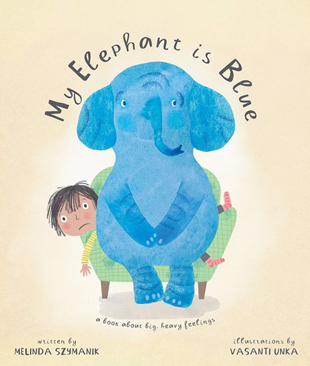You may know Coleman Barks' paraphrase of Persian mystic poet Jelaluddin Rumi's "The Guest House," which begins:
This being human is a guest house.
Every morning a new arrival.
A joy, a depression, a meanness,
some momentary awareness comes
as an unexpected visitor.
Welcome and entertain them all! ...
In Melinda Szymanik's book the guest is a newly arrived blue elephant, who sits on the young narrator's chest — making it hard to move, breathe, or talk — and who is, understandably, not very welcome at first. Family members try to help, encouraging the child to cheer up or eat something, but not even chocolate appeals.
When the child wants to go for a walk — and cannot do so with the elephant on them — the energy starts to shift:
"I want to go for a walk," I said to Blue. "Can you move?"
"Hmph," Blue replied, turning her back to me.
Was she crying?
What makes this book special is this astute recognition of the sadness that underlies depression and of the need to reach out and befriend the depression rather than try to push it away. Vasanti Unka, known for her colorful and inventive artwork, illustrates this dynamic sensitively, as when the child gazes at the elephant in concern while a large teardrop frames the scene.
Unka is just as good at conveying delight and whimsy when the mood lightens. A picture near the end of the elephant and the child lying side by side on their backs in the grass, eyes closed and smiling, the elephant's ears spread out like fans above her head, is one of our favorites.
Three-to-seven year olds will find consolation in these pages. All of us can use the reminder to be "grateful for whoever comes," as Rumi (via Barks) puts it, "because each has been sent as a guide from beyond."
